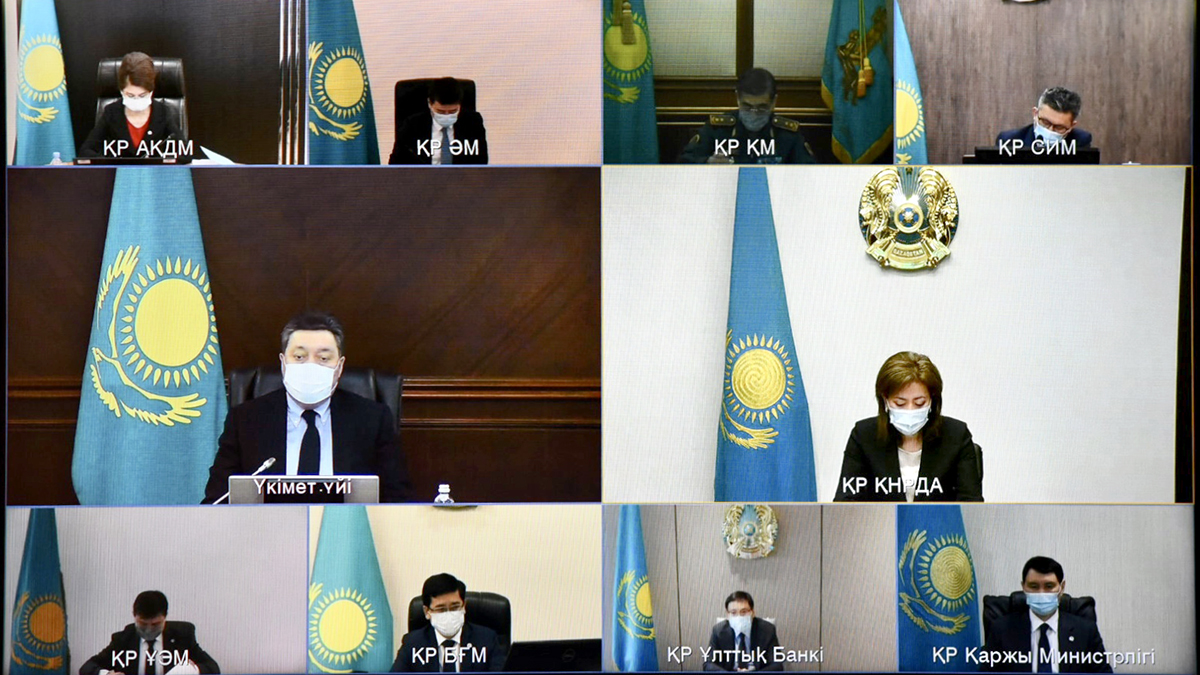NUR-SULTAN – The Kazakh government, the National Bank, and the Agency for Regulation and Development of Financial Markets signed an agreement on coordination of macroeconomic policy measures for the next three years, the Kazakh Prime Minister’s press service reported.

During the meeting. Photo credit: primeminister.kz
“Improving living standards and the well-being of the population is the main priority of the country’s social and economic policy. Therefore, coordination of monetary, fiscal, and structural policies, as well as financial sector development policies will take place,” said Kazakh Prime Minister Askar Mamin.
The measures envisioned in the document are categorised across three areas.
The first is improving macroeconomic sustainability that will be based on a countercyclical macroeconomic policy stimulating business activity and balancing low inflation, a stable financial system and economic growth.
The second area is the development of the financial market in line with the national concept on financial sector development until 2030. The measures will be taken to substantially expand bank lending to the economy.
The third area, which is enhancing long-term economic growth potential, will continue to encourage economic diversification and integration into regional and global value chains.
“A fundamentally new institutional framework will be developed to create conditions for high-quality and sustainable economic development in the context of the new economic reality. Measures will be taken to establish a new economic structure based on the competitive non-resource sector and integration into regional and global value chains,” said Kazakh Minister of National Economy Asset Irgaliyev.
Economic diversification will be focused on developing the agro-industrial complex, industrialisation, and qualitative digitisation.
“The government will develop a concept for entrepreneurship development aimed at creating favorable conditions for businesses in the country. As part of a package of urgent measures to stimulate business activity, the government will significantly simplify regulatory policy by reducing the administrative burden on business entities,” he said.
As part of the agreement, the National Bank will focus on gradually reducing inflation, making long-term savings in local currency attractive and enabling businesses to plan long term investments.
“To improve the effectiveness of the monetary policy, the National Bank will take measures to improve the efficiency of liquidity regulation. The measures taken with the government to develop the government securities market will facilitate the efficient use of liquidity in the market for economic needs. Efficient liquidity binding will prevent overflow of funds to the foreign exchange market reducing pressure on the exchange rate and inflation,” said National Bank Chair Yerbolat Dossayev.
The Agency for Regulation and Development of Financial Market will be responsible for ensuring long term stability of the financial system, including by expanding risk-based supervision tools. It will also review the interim prudential measures introduced in 2020 to ensure the stability of the banking system and business lending, said the agency’s chair Madina Abylkassymova.
To ensure greater liquidity for non-performing assets, the agency will also prepare legislative amendments to remove existing legal and tax barriers and attract private management companies to support distressed assets.
In line with the task set by Kazakh President Kassym-Jomart Tokayev, the people’s IPO project will be revised to involve local and foreign retail investors in the stock market as part of a broader effort to increase the number of private Kazakh issuers with small and medium capitalisation.


